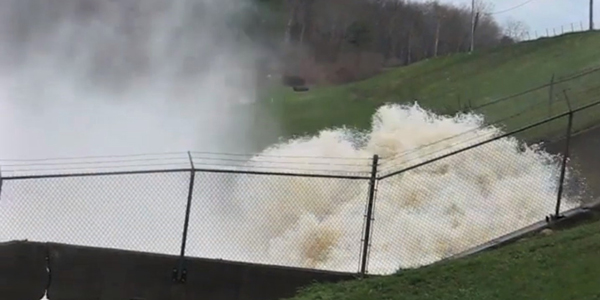By Amanda Durish Cook
FERC last week refused to budge on its decision to revoke the license of a small hydropower plant in Michigan over the owner’s longstanding noncompliance with safety measures.
The commission on Jan. 17 denied rehearing on Boyce Hydro possibly restarting operations at the 4.8-MW Edenville Dam, which was ordered closed in October over insufficient spillway capacity. (See FERC Upholds Michigan Dam Closure over Safety Fears.)
“In multiple orders, the commission has set forth a history, going back to 2004, of Boyce Hydro’s failure to comply with its license for the Edenville project, the commission’s regulations and commission orders. Of particular concern has been the project’s inability to pass the probable maximum flood due to inadequate spillway capacity,” FERC repeated in its latest order on the issue (P-10808-064).
Boyce and the Sanford Lake Association sought rehearing of FERC’s decision to revoke the license, arguing the commission didn’t consider how the revocation could negatively affect a potential transfer of the license. Acquiring a new license, the two said, is an expensive, uncertain and drawn-out process. In addition to the Sanford Lake Association, the Wixom Lake Association and the Saginaw Chippewa Tribe have expressed interest in taking over ownership of the dam.
Boyce said that a new license to replace the 20-year-old license “would require environmental, recreational and other study information required in contemporary licenses.” It pointed out that obtaining a new license could be further complicated by the dam’s inadequate spillway capacity and the fact that the water quality on the original license had been waived.
But FERC wasn’t swayed: “It is not in the public interest for the commission to delay action addressing a licensee’s long history of noncompliance with dam safety regulations out of concern that such action may affect the possibility (based mostly on speculation) that some third party might accept transfer of the license and promptly bring the project into compliance.”
FERC said the process of acquiring a new hydroelectric license can be expedited with certain procedural requirements waived. The commission also said the lake associations’ meetings over the dam are too preliminary in nature to persuade it to change the license revocation into a license suspension, as requested by the Sanford association. The meetings, FERC said, “do not provide any certainty as when the Edenville project’s public safety and environmental deficiencies would be remedied.”
The commission reiterated that Boyce has been on notice that its noncompliance could lead to license revocation since “at least June 2017” and that the company and interested buyers have had “ample opportunity to investigate the option of license transfer.” It added that it received no indication that a third party was ready to assume the project. Further, Boyce never provided the commission with a timetable for increasing spillway capacity when “continuing required work would have been wise,” FERC said.
Boyce and the Sanford Lake Association also argued that the license revocation could negatively impact public safety because, absent income from electricity generation, the spillways won’t be repaired or upgraded. FERC said dam safety enforcement will fall to the Michigan Department of Environmental Quality, which can instigate civil action.
The commission also rebuffed the argument that its order would disrupt a state-mandated lake level, saying nothing in its license revocation is stopping Boyce or a third party from operating the project as a non-generating facility to maintain water levels.
“For over 14 years, the commission has gone to great lengths to compel compliance with the license requirements, and Boyce Hydro has delayed, disregarded its responsibility and claimed that it was not financially capable of meeting such requirements. Meanwhile, Boyce Hydro continued to benefit from the revenues generated by the project,” FERC said. “There is no evidence that allowing Boyce Hydro to maintain its project license will result in a different outcome or that the longstanding compliance issues will be remedied.”
Finally, the commission noted that Boyce failed to put money into escrow to fund necessary spillway improvements, as it promised in 2008. The company also never followed up on a promise to provide FERC with a list of its financial assets.
“A licensee’s lack of financial capacity does not excuse years of noncompliance with important license conditions,” FERC said.




